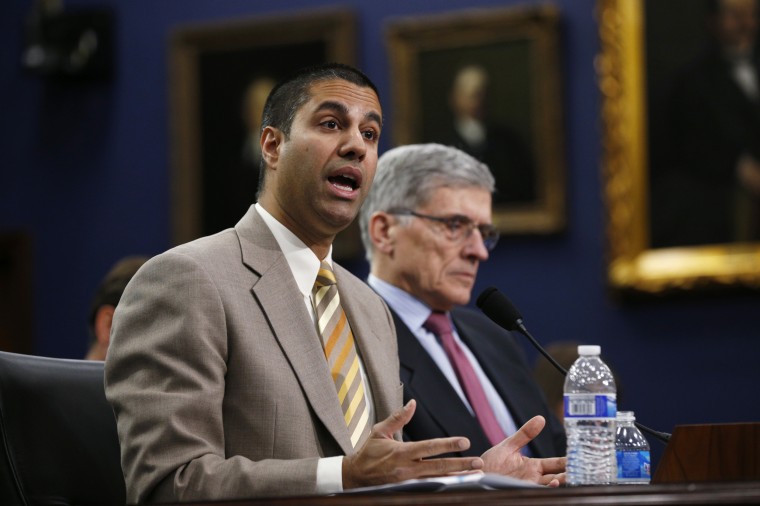It’s the one thing everyone can agree on in these divisive times: We all hate robocalls. But how will the Federal Communications Commission respond to this growing problem with Ajit Pai, a Republican, as the new chairman, appointed by a president who wants to slash government regulations?
The FCC has already received petitions from student loan servicers to ease rules on robocalls. They want the commission to remove limits on the number and type of robocalls they can make when trying to collect a debt owed to the federal government.

Last week, the National Association of Federally-Insured Credit Unions also sent Pai a letter asking him to reconsider current robocall rules. In his letter, B. Dan Berger, NAFCU’s CEO, said current regulations do more harm than good by “making it extremely difficult for credit unions to contact their members about potentially fraudulent activity, identity theft, and data breaches.”
Robocalls Are the Number One Complaint
Consumer groups have already expressed their outrage at the idea of rule changes that would allow more computer-generated phone calls.
“Consumers have made it clear that they want to have control over the robocalls they receive and it’s important to maintain the rules that provide that control,” said Maureen Mahoney, a public policy fellow at Consumers Union (CU), the policy and action division of Consumer Reports. More than 750,000 people have joined CU’s Campaign to End Robocalls.
In his first comments on the subject, chairman Pai stated that “enforcement is a critical priority” for the FCC and he wants it to take “aggressive action” against those who place illegal robocalls.
“Artificial or pre-recorded calls are intrusive, they’re unwanted, they’re frankly a nuisance,” he said. “In fact, they’re the number one source of consumer complaints that we receive here at the FCC.”
While Pai said he wants to find additional ways to “make sure consumers are protected from this scourge” he’s also said his main goals are to modernize regulations and remove “unnecessary or counterproductive” ones.
In a speech to the Free State Foundation in December, Pai said that in the months ahead, the FCC needs to “fire up the weed whacker and remove those rules that are holding back investment, innovation, and job creation.”
How Will Pai Handle the Topic?
So where will the new chairman come down on robocalls?
Last week the Consumerist said Pai’s history on the subject “has us wondering if he’ll continue the FCC’s work in curbing robocalls or give in to businesses who want to use them to sell us things.”
NBC News contacted the FCC to see if the chairman wanted to comment on this concern and was referred to his recent statements on the subject.
Senator Claire McCaskill (D-Missouri) has been a fierce advocate for both the government and industry to do more to tackle the growing robocall problem. In a statement to NBC News, she called on Pai to continue the crackdown.
“It’s clear that consumers want fewer robocalls, not more — and I’ve begun discussions with Chairman Pai to find ways we can work together to ensure millions of Americans aren’t plagued by these unwanted calls,” Sen. McCaskill said in her statement. “If we’re going to make real progress in cracking down on illegal robocalls, the FCC needs to continue its aggressive enforcement and continue working with us to put pressure on the phone companies to do more to help consumers.”
Debt Collectors Want More Robocalls
The Telephone Consumer Protection Act (TCPA) governs robocalls. It prohibits telemarketing robocalls to landlines without prior written permission and bans all non-emergency robocalls and robo text messages to cellphones without prior written permission.
Last year, Congress carved out a big loophole in that law for companies that collect a debt owed to or guaranteed by the federal government, such as student loans. They were no longer required to get prior permission to robocall or text those borrowers.
In August, with Democrat Tom Wheeler as chairman, the FCC passed rules that limited those unsolicited contacts to three robocalls or texts a month — and only to the debtor’s cellphone. It also gave the borrower the right to tell the collection company to stop calling.
In December, a group of student loan servicers and debt collectors, including Navient and Nelnet, petitioned the commission to reconsider and revise what they called its “arbitrary” rules. They claim those rules are contrary to the intent of Congress — to ensure the timely repayment of billions of dollars in outstanding federal student loans. (Neither company returned requests from NBC News for comment.)
Related: Student Loan Giant 'Navient' Facing Lawsuits Over Lending and Repayment Practices
The student loan companies argue that being limited to three attempted contacts a month by robocall “is drawn from thin air” and not supported by any data. They also want permission to contact relatives, references and others in the borrower’s file and to be able to make robocalls to wrong phone numbers without penalty.
The petition says allowing “early, effective, and frequent contact will reduce the frequency of borrower delinquency and default.” The FCC’s current rule, it says, “will impede federal student loan services’ ability to proactively inform borrowers of the repayment options that can keep them away from delinquency and default.”
The National Council of Higher Education Resourses, a trade association that represents student loan servicers and debt collectors, filed a second petition with the FCC last week. It says the current rule would “be harmful to millions of federal student loan borrowers who want and need timely and accurate information to better manage their student loan debt so they can avoid delinquency and default, and to rehabilitate loans that have defaulted.”
It should be noted that when the FCC enacted the three-call rule for these debt collection robocalls, then-commissioner Pai voted against it.
Consumer Groups Say Keep the Rules in Place
Last week, a coalition of 18 consumer advocacy groups, including Consumers Union, U.S. PIRG, The Center for Responsible Lending and the National Consumer Law Center sent a comment letter to the FCC asking the commission to keep its rule in place.
“The purpose of the FCC rules is to protect people from unwanted, harassing robocalls,” said Margot Saunders, an attorney with the National Consumer Law Center. “We’re very concerned that the commission, under its new leadership, might permit many more calls from student loan services and other debt collectors.”
Consumer advocates say debt collectors have various ways to reach borrowers — by mail and email or they can pick up the phone and call, or even place up to three robocalls and leave a message.
“It’s the ease with which collectors can make these robocalls that allow them to call so frequently and abusively that causes the problem,” Saunders told NBC News. “We have cases where these student loan servicers have debtors who are already paying on their debt. In one case, the debt collector called one number over 500 times after the consumer had said to stop calling.”
Consumers Union points out that robocalls can also be costly to the estimated 75 million Americans who have prepaid or pay as you go cell plans. Unwanted robocalls can eat up precious minutes.
“The FCC’s rules are sensible rules that prevent people from being harassed by incessant collection calls, CU’s Mahoney told NBC News. “They also prevent the dissemination of sensitive personal and embarrassing information to friends, neighbors, co-workers and employers. A barrage of robocalls is not just annoying, it may push consumers to make payments to the loudest or most persistent debt collector just to end the harassment, even for debt they do not owe.”
FCC chairman Pai has stated that he will continue working with the Robocall Strike Force, an industry-led group formed last summer. Former FCC Chairman Wheeler helped establish the strike force as a way to get the industry to create technology to deal with the growing robocall problem — especially for landline phones — rather than be forced to act by the commission.
How to Limit Robocalling
A variety of apps and services — many of them free — make it possible to reduce or eliminate unwanted robocalls on some landline phones and all mobile devices. They work by blocking the call, alerting you to a possible robocall or forwarding suspicious calls to voicemail.
One of the oldest robocall blockers, Nomorobo, is free and works on internet-based (VOIP) phone networks. Nomorobo recently released an app for both Android and Apple smartphones. It’s $1.99 a month, after the 30-day free trial.
Other popular apps for both Android and Apple phones include: TrueCaller, Hiya, and PrivacyStar. AT&T now offers a free service called AT&T Call Protect for its smartphone customers. CTIA, the wireless industry association, has a list of apps that block robocalls organized by operating system.
The Federal Trade Commission has a tip sheet on reducing unwanted calls. You can file complaints about robocalls with the FTC and with the FCC. The Consumer Financial Protection Bureau has tips for student loan borrowers.
Herb Weisbaum is The ConsumerMan. Follow him on Facebook and Twitter or visit The ConsumerMan website.

